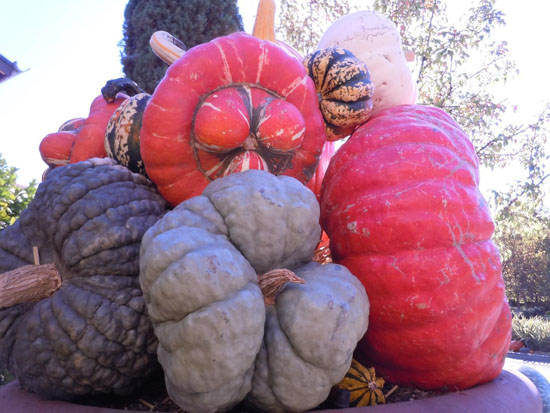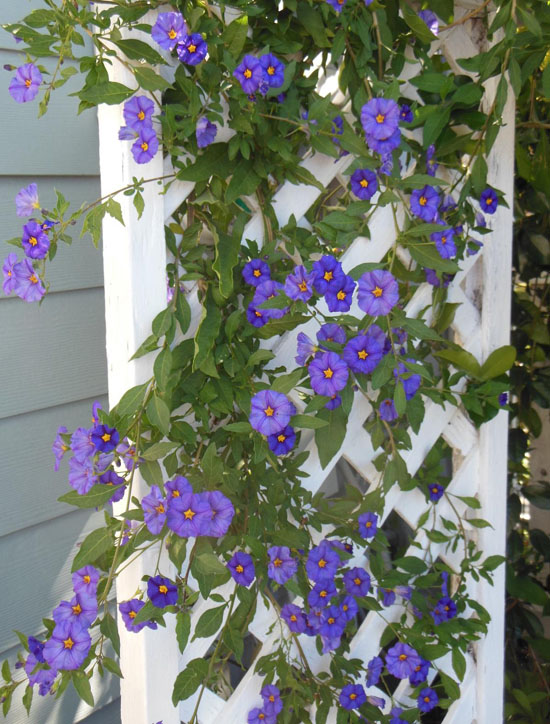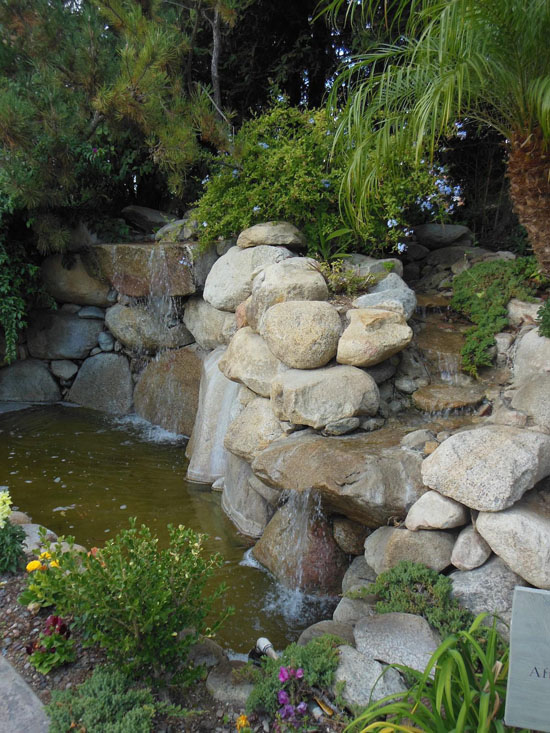 |
|
|
A plethora of blanket flowers and daisies adorn the autumn landscape. Photos Cynthia Brian
|
|
|
|
|
|
Fall is back! Our local trees are changing their coats from various colors of green to yellow, orange, red, gold, and brown. The weather is still warm during the day with cooler nights, offering gardeners the perfect opportunity to purchase and plant their favorite autumn trees, shrubs, and natives from well-stocked nurseries. As children and teens prepare costumes for Halloween, pumpkin patches welcome family exploration. Our vegetable gardens take their final bow and it's time to prepare the soil for winter crops. Garlic, onions, and cool season greens including lettuce, spinach, chard, and mustard along with beets, turnips, parsnips, and other root vegetables are ready to be planted. It's delicious autumn - and don't you just wish you were a bird?
 � PRUNE vines, summer perennials, berry canes, and cut back out-of-bound ground covers.
� PRUNE vines, summer perennials, berry canes, and cut back out-of-bound ground covers.
 � AERATE lawns and fertilize. Re-seed grass or install sod.
� AERATE lawns and fertilize. Re-seed grass or install sod.
 � PLANT winter annuals in October as the sun is still warming our days. Selections include cinerarias, primroses, violas, pansies, cyclamen, and ornamental cabbage.
� PLANT winter annuals in October as the sun is still warming our days. Selections include cinerarias, primroses, violas, pansies, cyclamen, and ornamental cabbage.
 � ADD an architectural texture to your landscape with the drought tolerant grasses such as Mexican Feather Grass, Red or White Fountain Grass, and Rattlesnake Grass.
� ADD an architectural texture to your landscape with the drought tolerant grasses such as Mexican Feather Grass, Red or White Fountain Grass, and Rattlesnake Grass.
 � CONTROL snails and slugs with bowls of beer, Slugo, or Deadline.
� CONTROL snails and slugs with bowls of beer, Slugo, or Deadline.
 � EXTEND the life of your Jack O'Lanterns by coating the cut sides with petroleu-m jelly.
� EXTEND the life of your Jack O'Lanterns by coating the cut sides with petroleu-m jelly.
 � TRANSITION indoor plants that you have summered on the patio to the inside by repotting if necessary. Clean the top of the soil, inspect for insects, dispose of dead leaves, and water thoroughly before placing in a sunny interior.
� TRANSITION indoor plants that you have summered on the patio to the inside by repotting if necessary. Clean the top of the soil, inspect for insects, dispose of dead leaves, and water thoroughly before placing in a sunny interior.
 � PROTECT tender plants from a frosty night by covering with a sheet, blanket, or other non-plastic material.
� PROTECT tender plants from a frosty night by covering with a sheet, blanket, or other non-plastic material.
 � TUCK favorite spring blooming bulbs into your landscape beginning at the end of October through January. Dutch Iris and Daffodils are both deer and gopher resistant.
� TUCK favorite spring blooming bulbs into your landscape beginning at the end of October through January. Dutch Iris and Daffodils are both deer and gopher resistant.
 � DIVIDE calla lilies, daylilies, daisies, and naked ladies every few years for best blooms.
� DIVIDE calla lilies, daylilies, daisies, and naked ladies every few years for best blooms.
 � GATHER pine needles from the base of pine trees to use as mulch around acid loving plants such as roses, azaleas, rhododendrons, fuchsias, camellias, and gardenias.
� GATHER pine needles from the base of pine trees to use as mulch around acid loving plants such as roses, azaleas, rhododendrons, fuchsias, camellias, and gardenias.
 � BURSTS of color for the autumn garden are found with plumbago, gerbera, society garlic, sea lavender, salvia, penstemon, and hollyhock.
� BURSTS of color for the autumn garden are found with plumbago, gerbera, society garlic, sea lavender, salvia, penstemon, and hollyhock.
 � DEADHEAD roses weekly for continuous blooms until hard pruning in January.
� DEADHEAD roses weekly for continuous blooms until hard pruning in January.
 � COLLECT rose petals early in the morning to dry for potpourri and sachets.
� COLLECT rose petals early in the morning to dry for potpourri and sachets.
 � CUT asparagus stalks to within 3 or 4 inches from the ground.
� CUT asparagus stalks to within 3 or 4 inches from the ground.
 � CREATE Pinterest boards or use apps to help you keep garden design ideas handy. Start now to think about your spring wish list.
� CREATE Pinterest boards or use apps to help you keep garden design ideas handy. Start now to think about your spring wish list.
 � RAKE leaves to add to a compost pile or bin along with food scraps, egg shells, coffee grinds, tea bags, newspaper, and other organic matter. Within a few months, you'll have a nutrient rich amendment for your soil.
� RAKE leaves to add to a compost pile or bin along with food scraps, egg shells, coffee grinds, tea bags, newspaper, and other organic matter. Within a few months, you'll have a nutrient rich amendment for your soil.
 � IDENITIFY trees you'll love to include in your yard by perusing a new book, "Landscaping with Trees" by Scott Zanon. Even though it profiles trees for residential and commercial properties in the Midwest, most of the specimens grow well in our area including maples, buckeyes, crabapples, dogwoods, magnolias, and many more.
� IDENITIFY trees you'll love to include in your yard by perusing a new book, "Landscaping with Trees" by Scott Zanon. Even though it profiles trees for residential and commercial properties in the Midwest, most of the specimens grow well in our area including maples, buckeyes, crabapples, dogwoods, magnolias, and many more.
 � REMOVE leaves and fallen debris promptly from ponds and water features to keep the water clean.
� REMOVE leaves and fallen debris promptly from ponds and water features to keep the water clean.
 � COLLECT seeds from your nasturtiums, cosmos, zinnias, marigolds, dahlias, and other annuals. Allow the pods to dry in a paper bag. Store in a cool, dark, dry place (shed, garage, closet) until next spring.
� COLLECT seeds from your nasturtiums, cosmos, zinnias, marigolds, dahlias, and other annuals. Allow the pods to dry in a paper bag. Store in a cool, dark, dry place (shed, garage, closet) until next spring.
 � WATER indoor plants once a month with a solution of 2 tablespoons of vinegar to a gallon of water to reduce salt build up and soil alkalinity.
� WATER indoor plants once a month with a solution of 2 tablespoons of vinegar to a gallon of water to reduce salt build up and soil alkalinity.
 � SCATTER seeds of lupine, California poppy, bachelor button, and larkspur. Scratch the soil to cover the seeds, discouraging birds and squirrels from dining.
� SCATTER seeds of lupine, California poppy, bachelor button, and larkspur. Scratch the soil to cover the seeds, discouraging birds and squirrels from dining.
 � KEEP bird feeders full and fountains fresh as incentives for our feathered friends to become permanent bug eating residents.
� KEEP bird feeders full and fountains fresh as incentives for our feathered friends to become permanent bug eating residents.
 � TRELLIS climbing vines. Potato vine, jasmine, honeysuckle, pink bower vine, and sweet potato vine make colorful, sweet smelling privacy screens.
� TRELLIS climbing vines. Potato vine, jasmine, honeysuckle, pink bower vine, and sweet potato vine make colorful, sweet smelling privacy screens.
 � REDUCE irrigation to once a week and once the rain begins, turn off your automatic sprinklers.
� REDUCE irrigation to once a week and once the rain begins, turn off your automatic sprinklers.
 � PICK up FREE seeds, potpourri, and garden book marks at the Be the Star You Are!(r) booth at the Moraga Pear and Wine Festival from 11 a.m. to 4 p.m. Saturday. Sept. 27. Participate in the story game and say hello to me. Sponsored by Lamorinda Weekly and Napa Valley Wealth Management.
� PICK up FREE seeds, potpourri, and garden book marks at the Be the Star You Are!(r) booth at the Moraga Pear and Wine Festival from 11 a.m. to 4 p.m. Saturday. Sept. 27. Participate in the story game and say hello to me. Sponsored by Lamorinda Weekly and Napa Valley Wealth Management.
 � FERTILIZE evergreen shrubs, vines, and conifers immediately if you didn't do so in September.
� FERTILIZE evergreen shrubs, vines, and conifers immediately if you didn't do so in September.
 � ENCOURAGE red-tip photinia to be dense and bushy by sculpting and maintaining a height and width of 6 to 8 feet. If you don't prune regularly, photinia become unmanageable 20-foot trees.
� ENCOURAGE red-tip photinia to be dense and bushy by sculpting and maintaining a height and width of 6 to 8 feet. If you don't prune regularly, photinia become unmanageable 20-foot trees.
 � CHECK olive harvests for grub and maggot larvae. Only treatment for this pest is a pheromone trap.
� CHECK olive harvests for grub and maggot larvae. Only treatment for this pest is a pheromone trap.
 � SEEK certified or experienced arborists to prune your favorite specimen trees. Remove a tree that has become too large for the space, intruding on foundations, or blocking views. Replace with appropriate sized trees, perhaps one that boasts autumn color.
� SEEK certified or experienced arborists to prune your favorite specimen trees. Remove a tree that has become too large for the space, intruding on foundations, or blocking views. Replace with appropriate sized trees, perhaps one that boasts autumn color.
 Remember that fire season is still in full swing, so be cautious with outdoor grilling and open flames. Be vigilant about keeping a defensible perimeter around your property. Enjoy the final days of our Indian summer.
Remember that fire season is still in full swing, so be cautious with outdoor grilling and open flames. Be vigilant about keeping a defensible perimeter around your property. Enjoy the final days of our Indian summer.

 Happy gardening and happy growing!
Happy gardening and happy growing!

|




